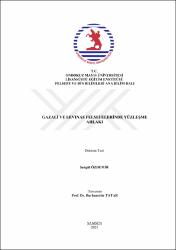Gazali ve Levinas felsefelerinde yüzleşme ahlakı
Citation
Özdemir, Ş. (2021). Gazali ve Levinas felsefelerinde yüzleşme ahlakı. (Doktora tezi). Ondokuz Mayıs Üniversitesi, Samsun.Abstract
Küresel dünyada bilgi akışının hızlanmasına ve iletişim sistemlerinin oldukça gelişmesine paralel olarak çeşitli ahlaki değerlere sahip insanlar birbirleriyle daha sık yüzleşmektedirler. Bu durum Tanrı, ben, öteki gibi çeşitli söylemlerle şekillenen farklı pratikler arasındaki ahlaki yüzleşmenin nasıl anlamlandırılacağını sorun haline getirmektedir. Bu sorunun anlamlandırılabilmesi için günümüzde kutsallıkla bağını koparmış ve "üst anlatı"larını kaybetmiş ve bir monad gibi hareket eden ben merkezli ahlaki bilincin eleştirisi önemli görünmektedir. Bu durum ahlaki hakikate dair "daha iyi" olanın tartışılabileceği eleştirel bilinci tahrip ederek hakikatin anlamına dair nihilist tavra geçit vermektedir. Bu nihilist tavır birbirine daha sık maruz kalan farklı pratikler arasındaki ahlaki yüzleşmeyi mümkün kılan "açık alan"ı tahrip etmektedir. Bu sebeple bu tez, ahlaki yüzleşmeyi kendi felsefi geleneklerinin aksine soyutlayıcı bağlamdan ziyade somut varoluşsal bağlamdan hareketle tartışan Gazali ve Levinas düşüncesini ön plana çıkarmaktadır. Bu tezde Gazali düşüncesinde farklı pratiklerin yüzleşmesine olanak tanıyan "açık alan"ın imkanı Tanrı merkezli mutlak özdeşlik zemininde yorumlanmaktadır. Levinas düşüncesinde ise "açık alan"ın imkanı bilincin özdeşlik kategorisine direnç gösteren öteki merkezinde yorumlanmaktadır. Her iki düşünür ahlaki bilincin eleştirel bağlamını mutlak metafizik bir kabule referansla yorumlamaktadır. Her iki yorum tarzı küresel dünyada "üst anlatı"lara güveni sarsılmış ve herhangi bir metafizik kabule direnç gösteren ben merkezli ahlaki bilincin eleştirel boyut kazanmasında, dolayısıyla da farklı pratiklerin ahlaki yüzleşmesine olanak tanıyan "açık alan"ın görünür olmasında işlevsiz kalmaktadırlar. Bu sebeple bu tezde hali hazırda Tanrı, ben, öteki gibi birbirinden oldukça farklı ve çeşitli merkezlerde şekillenmiş olan farklı pratikler arasındaki ahlaki yüzleşmenin imkanı soru-cevap diyalektiğinden hareketle tartışılmaktadır. Soru-cevap diyalektiğinin ortak-bağlayıcı zemini insanın dilselliği olgusundan hareketle yorumlanmaktadır. Bu dilselliğin ontolojik bağlamı ise herhangi bir metafizik söyleme referansta bulunmayan fenomenolojideki "fenomen" kavramı ekseninde tartışılmaktadır. Bu perspektifte ele aldığımız sorun merkezinde farklı pratikleri yüzleştiren "açık alan", ahlaki bilincin kendi dilsel-tarihsel sınırlarını keşfedebildiği ve ötekiliğe açık kalabildiği diyalojik karakterine işaret etmektedir. Bu diyalojik bilinç Tanrı, ben, öteki gibi çeşitli mecralarda şekillenen farklı pratiklerin birbirini baskılayıp yok etme amacı gütmeden "daha iyi" olan etrafındaki ahlaki yüzleşmesine olanak tanımaktadır. People with various moral values face each other more frequently in the global world in parallel with the acceleration of information flow and the development of communication systems. This situation makes it problematic how to make sense of the moral confrontation between different practices shaped by various discourses such as God, I or the other. To make sense of this question, a critique of current self-centered moral consciousness which moves like a monad by losing its "meta-narratives" and connection with the sacred seems urgent. This situation gives way to nihilistic attitude regarding the meaning of truth by destroying the critical consciousness which can make some arguments about the "better" in relation to moral truth. This nihilistic attitude destroys the "open space" that makes possible the moral confrontation between different moral practices that are more frequently exposed to each other. For this reason, this dissertation highlights the ideas of Ghazali and Levinas, who discuss moral confrontation in the contexts of concrete existential situations in opposition to the abstract theoretical approaches which are common in their own traditions. In this dissertation, the possibility of "open space" that allows different practices to confront is interpreted on the basis of God-centered absolute identity in Ghazali's thought. In Levinas' thought, the possibility of "open space" is interpreted in the center of "other" that resists the identity category of consciousness. Both thinkers discuss the critical context of moral consciousness with reference to an absolute metaphysical acceptance. Both forms of interpretation remain dysfunctional in the gaining of a critical dimension of the self-centered moral consciousness that resists any metaphysical acceptance and meta-narratives; this condition paves way to invisibility of "open space" that allows different practices to confront morally. For this reason, in this dissertation, the possibility of moral confrontation between different practices, which are quite different from each other and shaped in various centers, such as God, I, the other, is discussed on the basis of the question-answer dialectic. The common-binding ground of the question-answer dialectic is interpreted on the basis of the phenomenon of linguisticality of human being. The ontological context of this linguisticality is discussed in the axis of the concept of "phenomenon" in phenomenology, which does not refer to any metaphysical discourse. The open space, where different practices confront each other, points to the dialogical character of moral consciousness which can discover its linguistic-historical boundaries and remain open to otherness on the basis of the question which is discussed in this perspective. This dialogical consciousness allows different practices shaped in various mediums such as God, I, and the other to morally confront with each other by seeking the "better" without seeking to suppress and destroy each other.
















